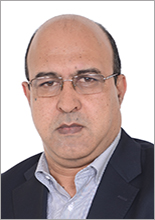Tunisia: Mineral Resources and the Energy Deficit
Compared to its neighbors Algeria and Libya, Tunisia’s energy resources are relatively modest. Since 2000, Tunisia has had a primary energy deficit, (including oil and natural gas), estimated at 1.6 million tons equivalent oil (Mteo) (2012), representing 19 percent of primary energy demand. Natural gas accounts for 53 percent of energy consumption, followed by oil (44 percent). The main energy consumers are industry (36 percent), transport (31 percent), and residential (25 percent). Primary energy consumption per capita is estimated at 0.78 tons equivalent oil (teo).
Proven petroleum reserves in Tunisia were estimated at 425 million barrels in 2011. These reserves are mainly located in the Gulf of Gabes (southeast) and the Ghadames basin in the south. In 2005, the Adam field at Borj El Khadhra in southern Tunisia became the leading oilfield. Seventy-three percent of national oil production comes from six concessions: Adam, Ashtart, El Borma, Dido, Miskar, and Oued Zarga. Production is estimated at 83,720 barrels/day while consumption amounts to 84,000 barrels/day. Consumption per 1,000 population is about 8 barrels/day. Natural gas proven reserves were estimated at 65 billion m3 in 2011, two-thirds of which are offshore. Sixty percent of natural gas production comes from the fields of Miskar (off the coast of Sfax) and Hasdrubal (in the Gulf of Gabès). There are also less important gas fields such as Bagel, El Borma, El Franning, and Zinia. Tunisian natural gas production is 3.6 billion m3 (per year) while consumption is 4.8 billion m3. Per capita consumption is estimated at 452 m3.
Tunisia also has large reserves of phosphate and ranks fifth among the world’s major producers. According to the Minerals Yearbook (USGS 2013), in 2011 Tunisia produced 5,000 tons of phosphates compared to 8,000 tons in 2007. Tunisia’s phosphate reserves are estimated at 100,000 tons. Surveys conducted for the exploitation of other minerals indicate there is little gold, silver, or copper. Only minerals available in small quantities exist, including barium and fluoride in the northern and central regions; and zinc, lead, and iron in the region of Le Kef (northwest), with a potential of about 500,000 tons.
Given its limited oil reserves, Tunisia maintains an energy deficit that is costly to the state budget and in 2004, to address its energy deficiency, Tunisia launched several programs to promote more efficient energy use. Subsidies for energy consumption represent 70 percent of all subsidies, estimated by the Tunisian Ministry of Finance at about 5,000 million Tunisian dinar (TD) in 2012 (US$1 = 1.6 TD). Budget commitments in terms of subsidies for energy are also dependent on the fluctuation of international oil prices and changes in the exchange rate. It is estimated that a US$1 change in the price of a barrel of oil increases the budget deficit by 50 million TD, and a TD/US$ exchange rate depreciation of 10 cents (millimes) causes a budget deficit increase of 30 million TD. Reform of oil taxation is thus imperative and could include better targeting of subsidies and a policy of rationalizing consumption.
Sofiane Ghali is a full professor of economics and Dean of the Higher School of Economic and Commercial Sciences of Tunis (ESSECT, University of Tunis). His fields of specialization are in the areas of industrial organizations and international economics. He has published papers in internationally refereed journals and contributed to several studies for Tunisian national agencies and organizations such as the ITCEQ and IACE, and international organizations like the World Bank, OECD, EIB, FEMISE, ERF, and GDN. He holds a Ph.D. in Economics.
Sami Rezgui is a full professor at the University of Manouba in Tunisia. He is specialized in the areas of macroeconomic policies, international economics, industrial economics and innovation policy. He is author of several research papers published in international journals and he is also consultant and contributor to various reports for international agencies (OECD, World Bank, Femise, Mediterranean Institute) and national institutions (Institute of quantitative Studies, Arab Institute of Business Managers, Ministry of Trade, Investment Agency Promotion). He Holds a Ph.D. in Economics.
